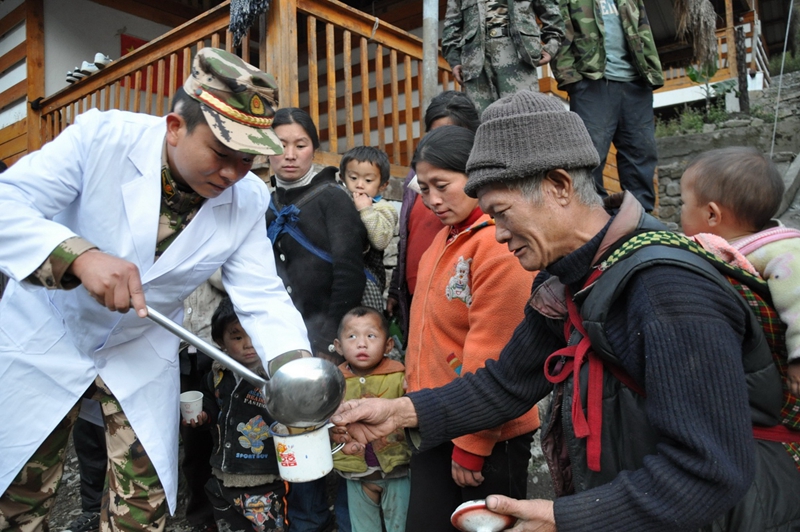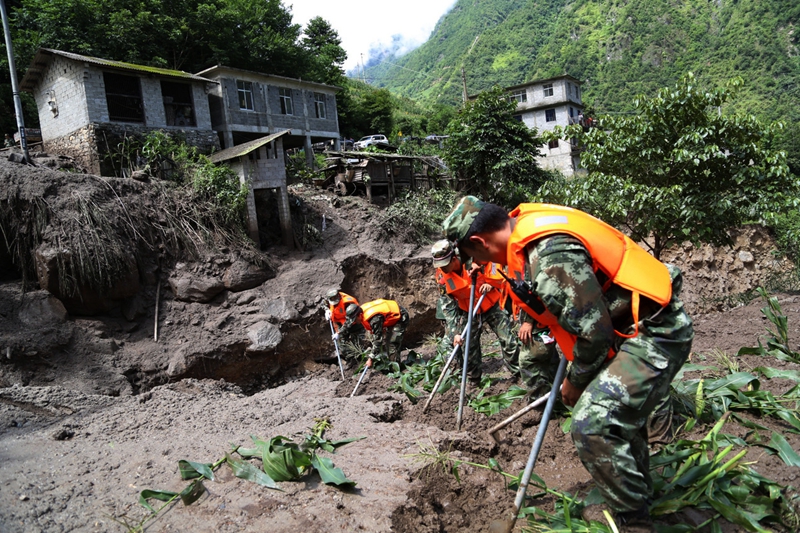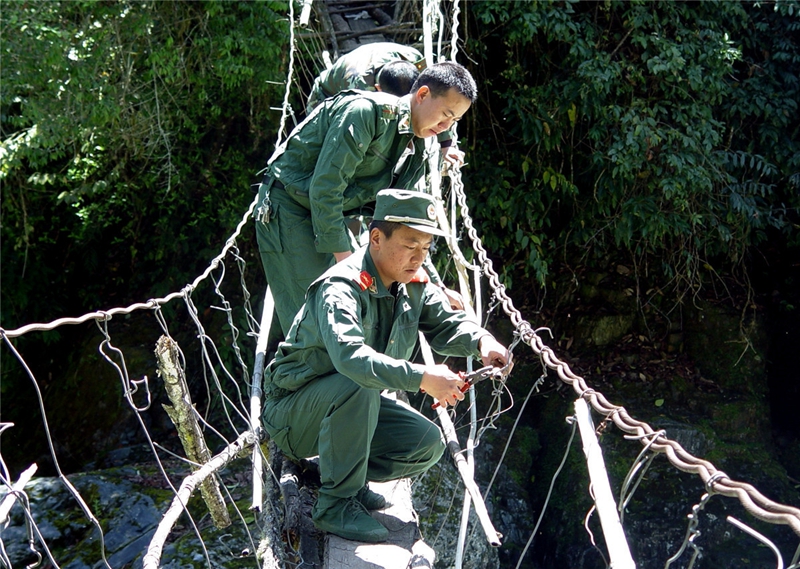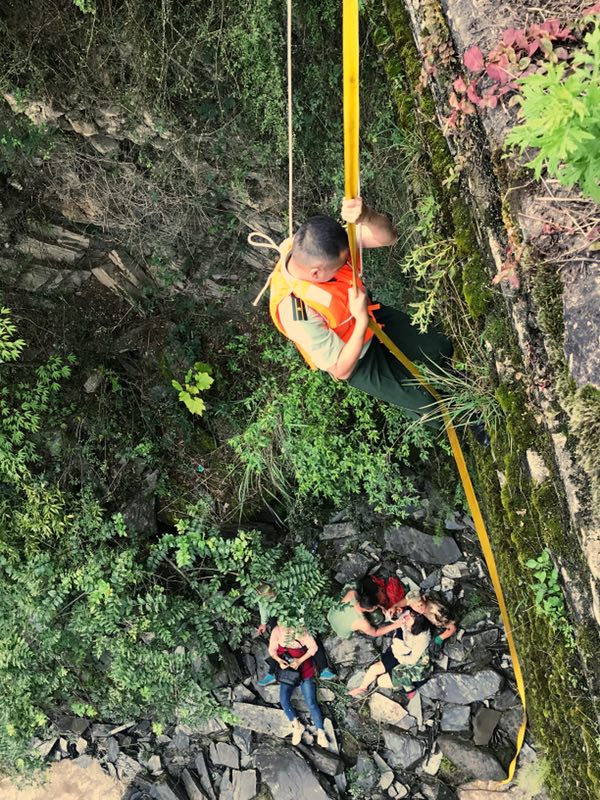
A border control officer distributes herbal medicine to residents of Dulongjiang township, Yunnan province, in 2011. [Photo/Xinhua]
Officers at a secluded post in the southwest patrol rugged terrain to stop smugglers. Zou Shuo reports from Nujiang, Yunnan.
Editor's note: This is the first in a series of stories about China's border patrol guards, focusing on the challenges they face and their work to keep the country safe, prevent trafficking of drugs and people, and maintain friendly relations with their counterparts in neighboring countries.
For the past 19 years, Li Xiaojun has worked as a control officer on the China-Myanmar border in Nujiang Lisu autonomous prefecture, Yunnan province.
Li, head of the Dulongjiang Border Control Police Station, and his colleagues drive down a rugged dirt road alongside the fast-flowing Dulong River to patrol the boundary several times a week.
Last month, flanked by the snowcapped mountains that form the border with Myanmar, the misty scenery resembled the classic heaven of Chinese myth as plants swayed in the sunlight under a clear azure sky.
However, Li and his colleagues had little opportunity to enjoy the sight; their eyes were firmly fixed on the rugged road that slices like a knife cutting through the mountainside.
"Rocks often tumble down the hillside, especially on rainy days. We need to pay full attention to the winding road, because one wrong turn will send everyone in the car into the river," the 38-year-old said.
As the only police station in Dulongjiang township, which borders Myanmar in the west and the Tibet autonomous region in the north, the small group of officers patrols about 115 kilometers.
Dulongjiang, named after the river that that winds through the township, was once one of the poorest areas of China. It is home to people of the Derung ethnic group, one of the smallest in the country in terms of numbers. Before the founding of the People's Republic of China in 1949, they lived insular, primitive lives.
Li and his colleagues were heading to the 41st boundary marker. After arriving at Qinlangdang village, where the road ends, they had to make a path through the primitive forest to reach the marker.
Having arrived and checked the scene, they had to find their way further through the forest to the 40th marker, which took about an hour.

Patrol members provide help after a mudslide in Shawa village, Yunnan, in 2014. [Photo by HAO YAXIN/FOR CHINA DAILY]
Leopards and snakes
"As it rains quite often, the road is very slippery and we also need to pay attention to all kinds of creatures along the way, including snakes, bugs, leopards, wild boar and leeches. We usually form a line, using a wooden stick to check for subsidence," Li said.
Difficult as it might sound, the journey is easier now than in previous years, when a routine patrol to the 41st marker took at least three days.
The journey is so dangerous that the two other border markers in the area, 42 and 43, haven't been visited since 1996.
Although the harsh environment means only a handful of people cross the border to and from Myanmar at the 41st marker, it is important that the officers provide security for the local people and display China's sovereignty over the land, according to Li.
"Although it is rare in Dulongjiang, we still need to make sure that there is no illegal smuggling of people or goods across the border. We cannot take any chances because no detail is insignificant along the border," he said.
In 2016, the police station built a post at Qinlangdang village, the nearest settlement to the border, to make it easier for the officers to patrol the boundary at an altitude of more than 4,000 meters.

Officers repair a rope bridge in Dulongjiang in 2006. [Photo/China Daily]
Power outages
Niu Ming, deputy instructor at the Dulongjiang Border Control Police Station, said the long distances, frequent landslides and avalanches mean officers at Qinlangdang often experience power outages, some of which last for days.
A large proportion of the food at the post needs to be transported from the police station, and when landslides block the road, the officers have to carry the rations on their backs, he said.
The rolling hills and harsh climate once made the journey from Dulongjiang to the outside world as difficult as the trip to the border posts in the forest, and landslides, avalanches, wild animal attacks and traffic accidents still make the journey extremely arduous.
In years gone by, the journey from Dulongjiang to Gongshan Dulong and Nu autonomous county took several days. It was not until 1999 that a road was built to link the area with the outside world, making it one of the last townships in China to be connected to a major highway.
The road has cut the journey time from Dulongjiang to Gongshan to half a day, provided there are no traffic accidents or landslides. However, access to the township is still blocked by snow for almost six months every year.
Apart from conducting border patrols, the officers at the Qinlangdang post and Dulongjiang station help the locals deal with daily problems.
They frequently make home visits to collect information for ID cards, such as photos and fingerprints, and to teach the villagers to grow herbs, keep bees and raise cattle and chickens to diversify their sources of income.
They also deliver daily necessities and food to the villagers, and sometimes even cut their hair.
They have also built a primary school in Maku village, with officers acting as teachers.
Almost 500 students have graduated from the school, with 162 going on to graduate from high school and 10 graduating from college.
When Li first arrived at Dulongjiang in 2000, there was no restaurant or cellphone coverage.
His parents live in his hometown of Hengyang, Hunan province, and his wife and two children live in Liuku, capital of Nujiang.
Officers in Dulongjiang are allowed 40 days of paid leave annually, but the isolation and poor roads mean few manage to take their full allocation.
"One of my biggest regrets is being unable to be with my wife when she was giving birth to our two children.
Unlike most couples, who can eat dinner together and be there for each other on 'rainy' days, we connect via a daily WeChat video and our reunions are always too short," Li said.
When he visited his wife and children in Liuku in June, his son was thrilled and proudly told his friends that his police officer dad had come home for a visit.
"My son and I weren't use to be so close, because I have spent little time with him. However, as he grows older, he can understand that I am doing something important. I can see that he is proud of me," Li said.

Officers rescue tourists who fell down a cliff last year. [Photo by XIONG QIANG/FOR CHINA DAILY]
Sacrifice
"Although I have sacrificed time with my family, other officers and soldiers before me have made the ultimate sacrifice with their lives to help develop the rarely visited region," he added.
For example, in 1964, an officer named Zhang Pu was diagnosed with acute appendicitis.
Although the condition could easily be cured in the outside world, the township had no operating facilities or medicine. Premier Zhou Enlai arranged for a Chinese plane to fly through what was then Burmese airspace and drop medicine and equipment, but it was too late.
In 1977, Zhang Zhifan died at age 18 when he fell into a valley as he explored new routes for the villagers. His body was never found. In 1991, Zhuang Yun was killed when he fell from a cliff edge as he helped locals to cut firewood.
Ten years later, Yu Jianhui, 20, fell into the Dulong River and drowned while helping to build a new road.
The officers pay their respects to their lost comrades at the graveyard in Bapo village several times a year. Although the ceremony only consists of a cigarette, a cup of wine, some snacks and a formal bow of recognition, it's performed with due dignity.
Yang Ming, 34, has been a border control officer for 15 years and has worked at Dulongjiang for the past three. "Initially, I was not so thrilled when I heard that I had been assigned to Dulongjiang because it is so isolated," he said.
His parents and 5-year-old daughter live in his hometown in Sichuan province. It takes about three to four days to travel there from Dulongjiang, so he only returns once a year.
The separation took its toll on his marriage, and he and his wife divorced in June.
"If I had chosen a different profession, perhaps we would still be married. But the job still has its perks; I can make around 10,000 yuan ($1,400) a month, almost double the amount for a job in my hometown. The money can offer my daughter better financial security than I had and possibly a better future," he said.
Yang plans to buy a house in Liuku and eventually bring his parents and daughter there because a new road linking Dulongjiang with Liuku is scheduled to open next year. It will cut the journey time of one to two days to six hours.
"If everything goes well, I will be able to go home and be with my daughter every weekend next year," he said.
|









7740f3b5-9ecb-438e-9052-76cb2d4bb671.jpg)

